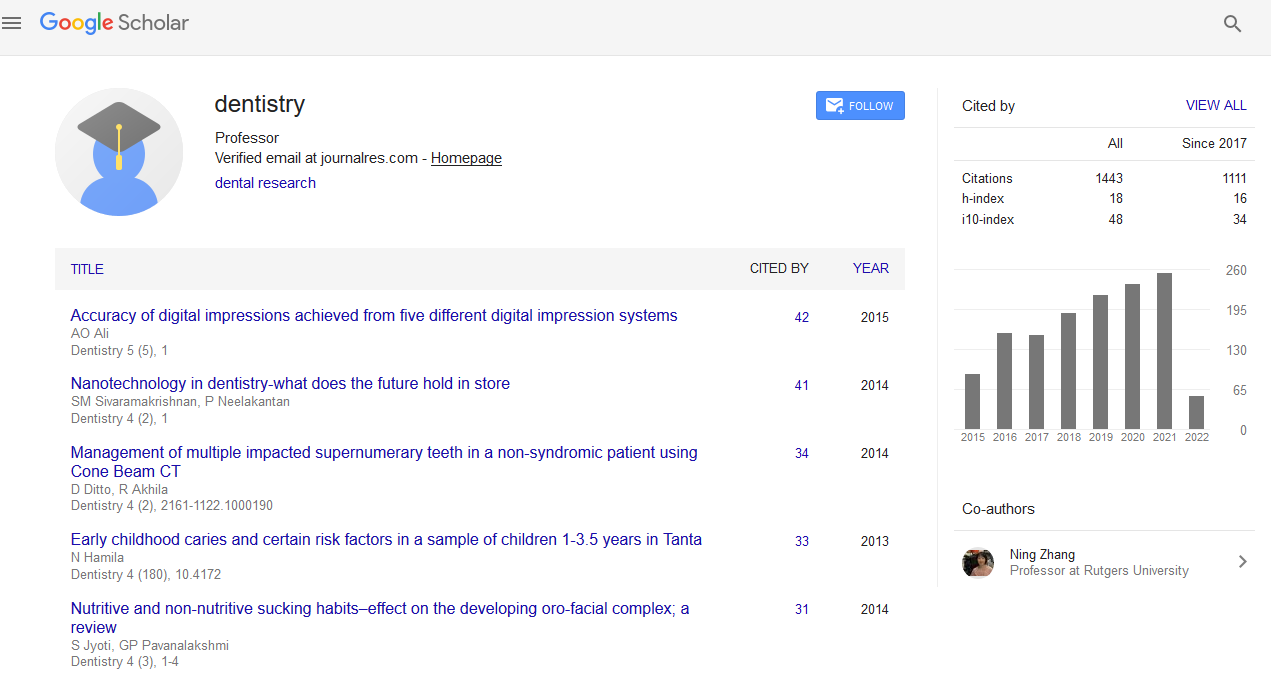Citations : 1817
Dentistry received 1817 citations as per Google Scholar report
Indexed In
- Genamics JournalSeek
- JournalTOCs
- CiteFactor
- Ulrich's Periodicals Directory
- RefSeek
- Hamdard University
- EBSCO A-Z
- Directory of Abstract Indexing for Journals
- OCLC- WorldCat
- Publons
- Geneva Foundation for Medical Education and Research
- Euro Pub
- Google Scholar
Useful Links
Share This Page
Journal Flyer

Open Access Journals
- Agri and Aquaculture
- Biochemistry
- Bioinformatics & Systems Biology
- Business & Management
- Chemistry
- Clinical Sciences
- Engineering
- Food & Nutrition
- General Science
- Genetics & Molecular Biology
- Immunology & Microbiology
- Medical Sciences
- Neuroscience & Psychology
- Nursing & Health Care
- Pharmaceutical Sciences
Lysophosphatidic acid: A mediator of emerging importance in oral health and disease
19th American Dental Congress
December 08-10, 2016 Phoenix, USA
D Roselyn Cerutis
Creighton University School of Dentistry, USA
Keynote: Dentistry
Abstract:
Lysophosphatidic acid [(LPA), 1-acyl-sn-glycerol-3-phosphate] is a pleiotropic, bioactive lipid present as multiple species in bodily fluids. They exert critical regulatory actions in homeostasis and are elevated in many pathophysiologies, including that of periodontal disease. We have shown that human gingival fibroblasts (HGFs) express LPA receptors LPA1-5, and that LPA18:1 exerts profound regulatory actions on HGF healing responses and elevation of intracellular calcium (through LPA1 and LPA3) although LPA 18:0, and 16:0 were more potent at the latter. We reported that the human salivary LPA 18:1, 18:0, and 16:0 species were 10-fold elevated in moderate-severe chronic periodontal disease, implicating LPA as having a role in human oral pathophysiology. LPA 18:1 remains the most investigated species, so we chose to fully survey by whole human genome microarray analysis (9 donors, n=3) whether LPA 18:1-treated HGF would show significantly changed transcription in categories of genes that regulate their biology, wound-healing, and inflammatory responses. The results (NCBI's GEO record GSE57496) showed that extensive and complex gene sets in these categories were significantly down-regulated (-16 to -2 fold) or up-regulated (2 to 115 fold) and validated by QRT-PCR of selected genes [IL-8>100 fold, IL-11>2 fold; suppressor of cytokine signaling 2 (SOCS2)>4 fold] vs. control. The microarray results also showed that HGF have transcripts for autotaxin (the main LPA-producing enzyme), confirming our findings that they produce multiple LPA species in a time-dependent manner. This additionally implicates LPA as an autocrine mediator in human oral homeostasis and pathophysiology, including the pathogenesis of periodontal disease.
Biography :
D Roselyn Cerutis holds a PhD in Biomedical Sciences and is an Associate Professor of Oral Biology and Pharmacology.
Email: rcerutis@creighton.edu


